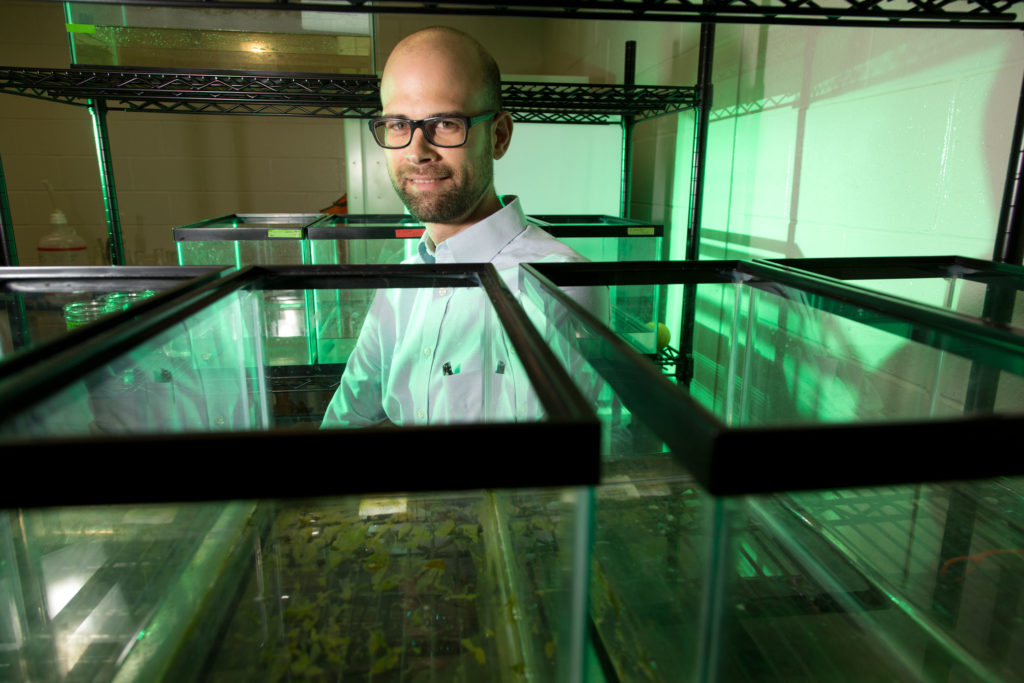For a scientist equally passionate about teaching and research, what could be better than working with talented undergraduates exploring pressing scientific challenges?
That’s exactly what Odum School of Ecology associate professor John Drake did this summer. Drake directed the Population Biology of Infectious Disease Research Experience for Undergraduates Site, a new NSF-funded research training program for undergraduates at UGA.
“We’ve just finished our first year of the program,” he said. “We had nine students complete it, from nine different colleges and universities, producing nine final projects—fantastic.”
The students, from institutions including elite private colleges, big state universities and small teaching colleges, spent nine weeks at UGA gaining experience in all aspects of research including study conception and design, data collection and analysis, and presentation of results.
They worked on projects addressing questions such as how new drugs for treating patients with tuberculosis will affect the success rate of pharmaceutical therapy, how competition between different gastrointestinal parasites of African buffalo affects parasite fitness and how predicted increases in temperature may change the interactions between monarch butterflies and their protozoan parasites.
“The goal of the program is to promote the integration of modeling and empirical studies. To solve the frontier questions in infectious disease dynamics, the next generation of scientists is going to need a broader toolbox, better training in what folks are starting to call ‘data science,’ ” Drake said. “We’re integrating across traditional biological disciplines but also with and across the quantitative sciences—computer science, mathematics and statistics.”
That kind of integration is how Drake conducts his own research, combining laboratory experimentation and theoretical modeling.
“I think it’s important to get those two things together,” he said, “not just in my research but in this university and actually across biology as a whole.”
This is a view he shares with the National Academies of Science and the National Science Foundation, each of which in recent years has identified the integration of quantitative and empirical science as an area of national need.
It’s an approach that allows him to tackle large-scale, complex questions that can’t be investigated using experimentation alone.
One of those questions involves critical transitions, or tipping points, in emerging infectious diseases—points beyond which a disease becomes an epidemic.
“Say you’ve got an infectious disease that’s sub-critical, meaning that human-to-human transmission is limited,” Drake said. “And then, gradually, something changes—maybe a decline in herd immunity because of vaccine refusal or a change in land use that increases the exposure of people to wildlife pathogens.
“These changes accumulate slowly but the system gets closer and closer to that critical point. And as it does, the theory predicts that there should be patterns in the sequences of case reports that are diagnostic of that fact,” he also said. “This problem is an excellent example of how the tools of modern data science—including pattern recognition and data mining—can be useful.”
It’s an interesting scientific question that has real-world application, according to Drake.
“Using those patterns as a foundation, we’re trying to develop the biological theory and statistical methodology to build early warning systems for infectious disease emergence,” he said.
UGA is a good place to be working on this kind of problem, Drake said, because there are so many people who bring different perspectives to bear on infectious diseases and who are eager to collaborate.
“We have the Computational Ecology and Epidemiology Study Group, an informal group of faculty and research scientists from across campus who are interested in quantitative methodology, theory and the development of modeling techniques, ” he said.
The group, which can be found on the Web at http://daphnia.ecology.uga.edu/ceesg/, meets weekly to discuss the latest research and troubleshoot problems.
Drake is glad to be at the Odum School of Ecology in particular.
“It’s interesting to see how ecology, the field that Gene Odum pioneered at UGA, now influences so many aspects of science,” he said. “Ecological thinking—thinking about lots of moving parts, different species interacting nonlinearly and evolutionary dynamics—has really influenced the way we think about infectious disease.”
